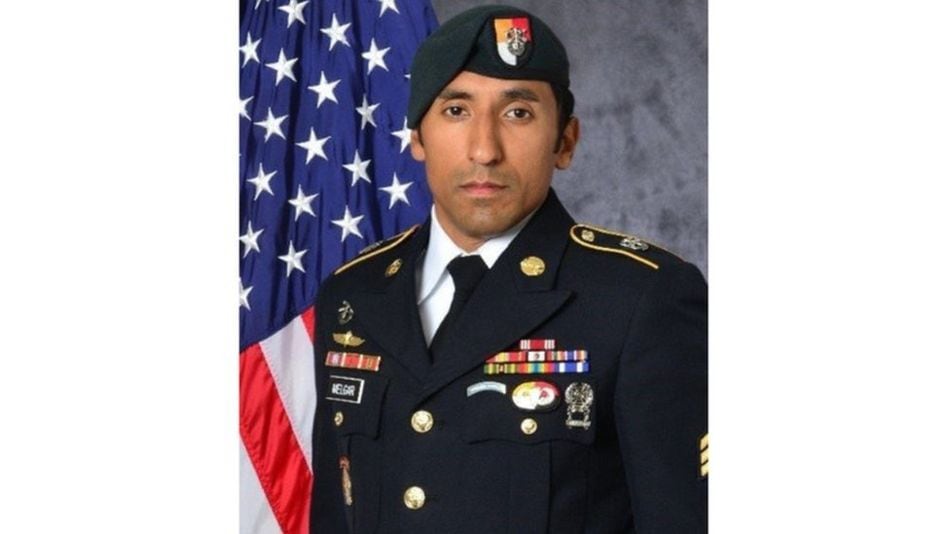Two of the four special operators charged with murder in the strangulation death of a Green Beret staff sergeant are negotiating plea deals with government prosecutors.
The Daily Beast reported earlier this week that Navy SEAL Chief Petty Officer Adam C. Matthews and Marine Raider Staff Sgt. Kevin Maxwell are working out plea deals for the charges they face in connection with the death of Army Green Beret Staff Sgt. Logan Melgar, 34, in Bamako, Mali on June 4, 2017.
Military Times has verified the report through sources close to the investigation.
Attorneys for both men declined to comment as to whether they were negotiating deals. Brian Bouffard, Maxwell’s attorney, told Military Times he could not discuss the case. Grover Baxley, Matthews’ attorney, said that it would “inappropriate to comment on possible plea negotiations.”
RELATED

But, Baxley added that his client “does look forward to getting an opportunity to explain the details of what actually happened in Mali in June 2017 since much of the reporting over the past 21 months has contained wildly inaccurate information. Most importantly, though, SOC Matthews hopes that he can assist the Melgar family in reaching some semblance of closure for this tragic situation.”
Attorneys for the remaining defendants, Navy SEAL Petty Officer Anthony DeDolph, 39, and Marine Raider Gunnery Sgt. Mario A. Madera-Rodriguez, said that they were not currently negotiating pleas with the government and were awaiting a rescheduling of the Article 32, or preliminary hearing that has now been postponed twice, most recently from March 6.
"We are in negotiations with the prosecutors for a new hearing date after they requested a continuance,” said Phillip Stackhouse, DeDolph’s attorney.
Colby Vokey, attorney for Madera-Rodriguez, said he did not know the current status of plea deals for the other defendants.
All four defendants face charges including felony murder, involuntary manslaughter, conspiracy, obstruction of justice, hazing and burglary.
Other than charging information, no official details of the alleged homicide have been released by the government.
Media reports from numerous outlets have collected pieces of information about the morning that Melgar died and events leading up to the incident and immediately following his death.
The two SEAL Team Six members first told investigators they found Melgar unconscious and tried to revive him. They later changed their stories, claiming they were practicing hand-to-hand combat training with Melgar in the residence, and that Melgar was drunk, passed out and they tried to revive him, according to media reports.
But, toxicology reports revealed no alcohol or drugs in Melgar’s system and friends told investigators that the staff sergeant didn’t drink.
The two SEALs later changed their story again, saying that they had ambushed Melgar in his room over a perceived slight when he didn’t give them a ride to a party. A witness later told investigators that one of the SEALs said he wanted to “get back” at Melgar for the incident, according to news reports.
But the SEALs didn’t initially tell investigators that two Marine Raiders were also in the room and helped restrain Melgar before one of the SEALs put him in a chokehold, which officials believe led to his death by strangulation.
The SEALs said they tried to resuscitate Melgar first through CPR then via a field expedient tracheotomy. But investigators later saw that differently.
According to the charge sheets, they have included the tracheotomy as part of an obstruction of justice charge against the same SEAL accused of choking Melgar, saying he performed the act to “hide evidence of the injuries inflicted” on Melgar.
Document details include allegations that the Marines and the SEALs went to separate housing for the Marines to get duct tape to restrain Melgar.
The four broke into Melgar’s locked room to assault him while he was sleeping, according to the charges.
But, at first, the SEALs told investigators the Marines weren’t there.
Madera-Rodriguez, the Marine gunny, told investigators that he saw Melgar and another of the defendants talk to each other and “chuckle and smile at the threshold” of Melgar’s door.
He also said that one of the SEALs and Melgar voluntarily began to wrestle each other.
Investigators believe both statements were lies, meant to cover up the attack.
Maxwell, the Marine staff sergeant, said he and Madera-Rodriguez were not in the residence and didn’t hear anything out of the ordinary. He said he didn’t know if anyone was drinking alcohol that night. While specific individuals were not listed in connection with using alcohol, investigators also believe Maxwell lied about alcohol use.
Investigators also have included disposing of the alcohol as part of the larger conspiracy charge against all four co-defendants, again to conceal evidence of what actually happened.
Melgar was close to the end of his deployment when he died. He reportedly told his wife he had a “bad feeling” about some of his fellow troops.
Though Melgar died on June 4, 2017, information on his death was not released to the public and only surfaced after media outlets published reported the accounts months later.
Army Criminal Investigative Division agents were initially assigned the case but turned it over to Naval Criminal Investigative Service on Sept. 24, 2017.
The troops were on a mission to support Malian and French counterterrorism units fighting al-Qaida factions in the region.
Todd South has written about crime, courts, government and the military for multiple publications since 2004 and was named a 2014 Pulitzer finalist for a co-written project on witness intimidation. Todd is a Marine veteran of the Iraq War.



